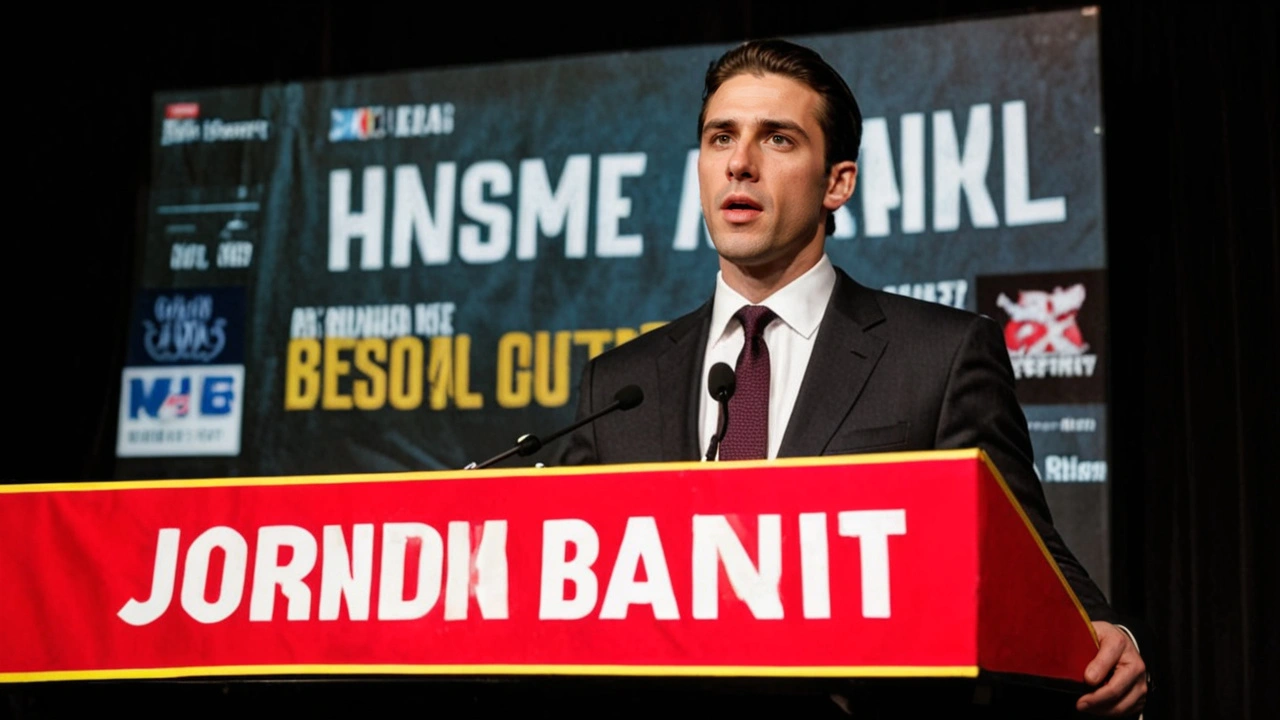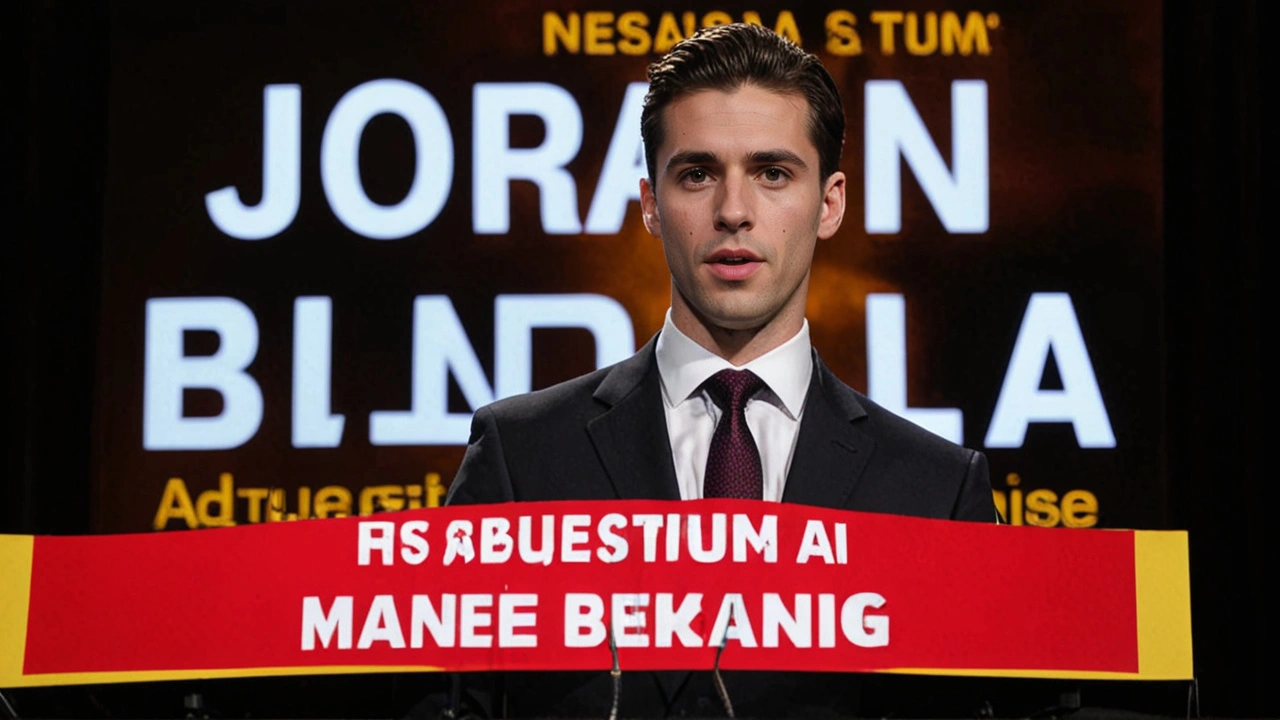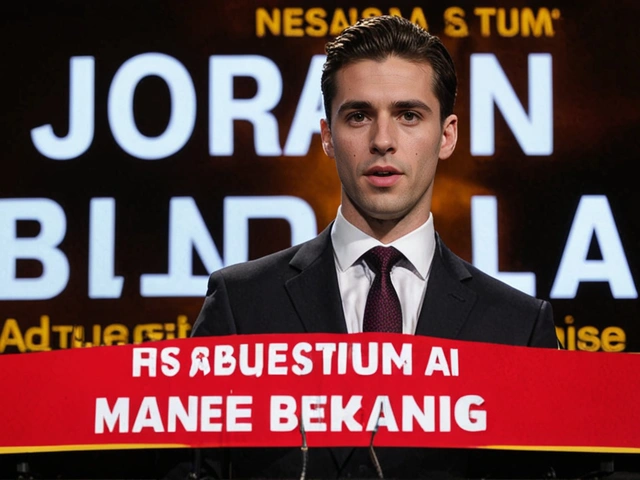Introduction to Jordan Bardella
At just 28 years old, Jordan Bardella is a name gaining traction across French political spheres. This young leader of the far-right National Rally (RN) party is not only striving to become the youngest prime minister in France's history but also stands as a symbol of a strategic shift within the party. Often linked to the charismatic Marine Le Pen, Bardella's ascension marks an evolution in the far-right party's approach to politics and their public image.
A Diverse Background Softening a Hard Image
One of the remarkable aspects of Bardella's rise in politics is his mixed heritage, with roots extending to Italy and Algeria. This diverse background contributes to presenting a nuanced image of the RN, traditionally known for its stern stance on immigration. Bardella masterfully leverages his heritage to relate to a broader French populace, resonating particularly well with the Muslim community. By doing so, he positions the RN as a party that defies the old stereotype of intolerance, striving instead for inclusivity within nationalist bounds.
Social Media Savvy for the Youth Vote
Bardella's campaign strategies effectively utilize social media platforms to connect with younger voters, a demographic that often feels alienated by traditional politics. Through relatable and engaging content, he has amassed a youthful following that appreciates both his policies and his modern approach. Videos, memes, and interactive campaign activities showcase his adaptability and keen understanding of modern communication channels, helping to significantly enhance his electoral appeal.
Political Strategy and Policies
The policies championed by Bardella revolve around core principles of law and order, stringent migration regulations, and limited social benefits exclusively for French citizens. He firmly stands behind the notion that public resources should prioritize nationals, aiming to tighten the reins on immigration—a cornerstone of his political platform. Additionally, Bardella proposes significant tax cuts and pension reforms, all underpinned by a call for beefed-up security measures, particularly within educational institutions.
His call to President Emmanuel Macron to dissolve parliament and initiate early elections reflects a calculated move to capitalize on the growing dissatisfaction among the public. Should this request be heeded, it could indeed lead to a seismic shift in the French political landscape.
International Stance and Rebranding Efforts
On the international front, Bardella seeks to distance his party from its historically perceived pro-Russia inclinations. While maintaining support for French weapon aid to Ukraine, he emphasizes a non-interventionist military stance. This marks a significant deviation from past positions and aligns more closely with broader European attitudes towards the conflict in Ukraine.
His ability to steer the party away from contentious past affiliations points to a deliberate rebranding. Marine Le Pen’s strategic handover to Bardella signifies an intent to refresh the party’s image, making it more palatable to a wider voter base while retaining its core values.

The Implications for French Politics
Bardella's rapid ascent within the RN and the broader political stage reflects a potential redefinition of far-right politics in France. Should he succeed in his bid to become prime minister, the implications could be far-reaching. Policies emphasizing national preference for social benefits, stringent migration controls, and robust law enforcement resonate with a substantial section of the electorate increasingly concerned with issues of national identity and security.
NATO and European Relations
On the international stage, a Bardella-led administration might also impact France's relationship with NATO and the European Union. His cautious approach to military involvement, coupled with a distinct nationalistic bent, can potentially create friction within these alliances. However, his rebranding efforts indicate a willingness to negotiate and redefine rather than outrightly oppose these relationships.
Conclusion
Jordan Bardella's trajectory from a youthful political foot soldier to the potential youngest prime minister of France is nothing short of remarkable. His adept use of modern communication methods, combined with a relatable persona, has carved out a unique niche in French politics. As he continues to garner support, his vision for a different France—focused on nationalism, security, and economic reform—could fundamentally alter the nation's political landscape. Whether you agree with his positions or not, Bardella's rise certainly marks a critical chapter in the story of contemporary French politics.



Comments
The rise of a young far‑right leader in France threatens the core values of liberal democracy. His emphasis on strict migration controls clashed with the inclusive traditions that Europe has cultivated. By positioning national preference above humanitarian concerns, he risks normalizing exclusionary policies. The rebranding of extremist rhetoric into a more palatable image does not change its underlying intent. Young voters drawn to his social‑media savvy campaign may overlook the long‑term repercussions of authoritarian governance. A leader who seeks to dissolve parliament for early elections undermines constitutional stability. The promise of tax cuts and pension reforms sounds appealing but often masks deeper cuts to public services. National security arguments can become a cover for curtailing civil liberties. Embracing a nationalist narrative tends to polarize societies and erode social cohesion. The delicate balance France maintains within NATO could be disturbed by a non‑interventionist stance. While distancing from pro‑Russia sentiments appears progressive, it may simply be tactical rather than principled. The interplay between domestic policies and international alliances cannot be ignored. Historical lessons show that charismatic leaders with exclusionary platforms frequently erode democratic institutions. It is essential to scrutinize the long‑term impact of such political shifts. Ultimately, the health of French democracy depends on vigilant citizens resisting simplistic nationalist solutions.
Honestly, I get why some young people find Bardula’s style appealing 😊. The memes and interactive posts make politics feel less stale. Still, it’s crucial we look beyond the flash and ask what those policies really mean for everyday folks. The emphasis on law and order can sound reassuring, but we need to balance that with protecting civil rights. It’s a tricky line, especially when it comes to immigration and welfare. We all want a safer, more prosperous France, but the solutions have to be inclusive, not exclusionary.
Hey folks, just thinking out loud here. Bardella’s use of TikTok and Instagram really shows how politics is evolving. When a leader can speak directly to the youth, it cuts out a lot of the noise. It’s not just about the policies but the connection he builds with voters. That kind of mentorship vibe can inspire more civic engagement. We should keep an eye on whether the message backs up the actions.
Wow, what a fascinating shift, isn’t it?; Bardella really seems to be rewriting the playbook,; taking a hard‑line stance while simultaneously using emojis and memes,; and that duality is quite striking,; especially when you consider the RN’s historical posture,; it’s almost as if they’re trying to wear two suits at once,; a tough exterior with a glossy interior,; which might just be the key to pulling in a broader electorate,; however, the underlying policies remain very much the same,; and that’s where the real debate begins,; are we seeing genuine transformation or just a clever rebranding strategy?
Bardella connects with youth easily. He uses simple language. Policies focus on security. Tax cuts sound good. We should watch the details.
Listen, Bardella's platform is a textbook case of nationalist populism wrapped in corporate lingo. He throws around terms like "sovereign resilience" and "strategic autonomy" while pushing hard‑line immigration bans. This is pure jargon designed to sound sophisticated, but it masks a fundamentally exclusionary agenda. It's high time we call out the rhetoric for what it is: a thinly veiled effort to consolidate power under the guise of national security.
Yo, Bardella’s energy is off the charts! He’s breaking all the boring political molds with his memes and quick videos. It’s like he’s speaking our language, not some old‑school politician. That kind of vibe can get a lot of people pumped about voting. Keep it simple, keep it real.
Totally agree! The fresh approach is exactly what the scene needed. While we stay hopeful, let’s also stay critical about how the policies will affect everyday life. Optimism works best when paired with a dash of scrutiny.
Just watching the conversation unfold. It’s interesting how social media can shift political narratives so quickly. I’m curious to see how this plays out in the next elections.
OMG, this is like straight outta a drama series! Bardella is totally redefining the game, and I’m here for the popcorn. He’s got that “I’m the future” vibe, but let’s not forget the history – we can’t just ignore the past, it’s defintely gonna come back around.
Hmm, the whole thing feels overhyped to me. I mean, there’s some merit, but is it really that groundbreaking? I’ll keep an eye out, but I’m not sold yet.
Let’s be crystal clear: the nationalist rhetoric is a thin veil for power grabs. Pretending it’s a fresh perspective is an elitist charade. The real issue is the aggressive push to limit freedoms under the guise of security – a dangerous road that many will follow if unchallenged.
Whoa, hold up! Are we really going to accept this narrative without questioning the underlying motives? It feels like an orchestrated attempt to reshape public opinion,; and that’s something we cannot simply overlook;
Isn’t it fascinating how a single charismatic figure can polarize an entire nation? The allure of strong leadership often masks deeper insecurities within a populace, perhaps a yearning for certainty in turbulent times. Yet, the quest for absolute authority may lead us down a path where liberty is compromised. In the echo chambers of social media, the seductive promise of simplicity can drown out nuanced discourse. One must wonder, are we trading depth for immediacy?
Interesting points! I’m always curious about how policies affect the average person. Simpler language helps me understand, but the real impact matters most.
Curious how the narrative shifts! 🤔 The blend of modern outreach with old‑school nationalism is wild. I’m watching closely.
When we talk about rebranding, we must ask: does the essence change or just the packaging? That’s the real philosophical question behind the political theater.
Data suggests that nationalist surges follow economic downturns, but correlation isn’t causation. The rhetoric can be compelling, yet it often overlooks systemic issues that require bipartisan solutions.
We’ll see how this evolves.